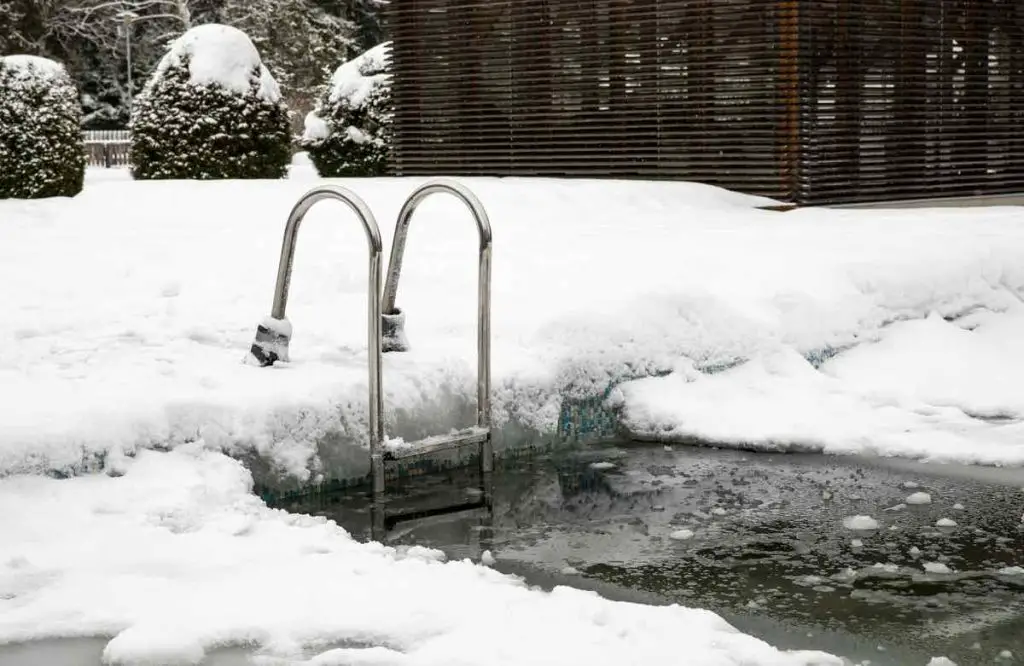It’s no secret that pool heaters provide a seemingly instant boost to the water temperature. Running the heater during cold days and frigid nights might seem like the logical solution. However, many pool owners notice various issues when they turn on the heater when it’s too cold outside.
You should run a pool heater during a freeze if the pump is on and the water is above 65 degrees Fahrenheit. Pool heaters aren’t supposed to run when the water is colder than 65 F because the temperature can ruin the internal components. Running the pump during a freeze will prevent plumbing issues.
Throughout this article, you’ll learn how freezing temperatures affect your pool heater, what you should do, and how you can prevent your plumbing from getting damaged when it’s cold outside.

Should You Run a Pool Heater in Extreme Cold?
You can run a pool heater in extremely cold temperatures, but it’s important to turn on the heater before it gets too cold. Once the plumbing freezes, turning on the heater will damage its internal parts. Sterling Pool Service recommends using winterizing plugs for your pool heater if you don’t intend to use it.
Another option is to install a directional valve to guide the water flow. These valves let you choose if the water goes through the heater or directly into the pool. Many pool owners don’t use their salt systems, heaters, and other equipment during the winter months. You can stick to the pump and filter if you keep the pump running to prevent it from freezing.
If you’re interested in using your pool heater to prevent the water from freezing during the winter months, head to the next section for more details.
How Do You Keep Your Pool Heater From Freezing?
To keep your pool heater from freezing, follow these steps:
- Run your pool pump when it’s close to freezing to prevent the plumbing from cracking. Extreme temperatures can crack the plumbing, including the unions, PVC pipes, and everything in between. Your heater, pump, filter, and salt cell can also break. Running water through these parts will stop them from getting too cold.
- If possible, close the valves going to your heater to bypass it. Some heaters have three-way valves. These valves let you control where the heated water goes. You can turn it off and send it only to the pool or only to the spa. If the water is freezing and you don’t want to use the heater, close the valve going to it.
- Insulate your pool plumbing. For example, FrozTech Pipe Insulation is a ⅛-inch plumbing tape that insulates your plumbing. It’ll prevent heat damage during the summer and unwanted freezing during the winter. The key with any insulation tape is to ensure there aren’t any gaps from one connection to the other.
- Consider running your pool heater at a lower temperature around the clock when it’s cold outside. Wayne Solar claims non-stop heater operation is often the best choice for pool owners. Not only does it prevent your pool equipment from freezing, but it also protects the plumbing. You can put the heater at its lowest temperature to save money.
- Winterize your swimming pool. Winterizing your pool will prevent it from getting algae, but it also stops the equipment from freezing. Potential winterizing tasks include adding a cover, placing inflatable support pillows under the cover, and running a variable-speed pump at its lowest speed around the clock. [Will a Pool Heat Up Faster With the Cover On?]
Most pool owners winterize their swimming pool during the winter months if it gets cold enough. If you live in a moderate climate, you might not need to worry about frozen pipes too often. However, extremely cold PVC and heater parts are prone to cracking. Always run the pump and cover the pool when the water is close to freezing.
Can You Run a Pool Heater in the Winter?
You can run a pool heater in the winter, but it’s important not to run it if the water is colder than 65 degrees Fahrenheit (18 degrees Celsius). The best workaround is to run the pump and heater before it gets too cold. You can maintain the water around 65 to 70 degrees Fahrenheit to prevent it from freezing.
According to Medallion Energy, almost all pool heaters can’t work below 65 degrees. This is because the heating element freezes. Furthermore, the heater has to work too hard to increase the temperature, costing you a fortune with gas or electricity. The good news is that pool heaters are excellent when it comes to maintaining a stagnant temperature.
Here’s what you should know about running a pool heater during the colder months:
- Heaters can be an integral part of the winterizing process. Many people run their heaters during the coldest hours of the night when it’s freezing outside. Start the heater before it dips below the manufacturer’s recommended operating temperature. The goal is to start it before it freezes and turn it off when it’s warmer outside.
- You don’t have to turn on the heater for the water to run through it. Run a low-speed pump to keep water flowing through the plumbing. This process prevents the plumbing from warping and cracking, but it also provides much-needed protection for the heater, pump, salt system, etc.
- Keeping your heater at the lowest temperature will save a lot of time and energy. Pool owners often cringe at the thought of running the heater non-stop. However, you can turn your heater to its lowest setting to save a lot of money. You’ll keep the pool water warm enough to prevent damage, but you won’t have a sky-high utility bill. Is It Cheaper to Leave a Pool Heater on All the Time?

Final Thoughts
Running a heater when the water is frozen will cause long-term damage to the plumbing. However, you can anticipate a freeze by running the pump and heater. Keep the water above 65 degrees Fahrenheit until the freezing temperatures go away. Remember to inspect the unions when the bad weather is over.
